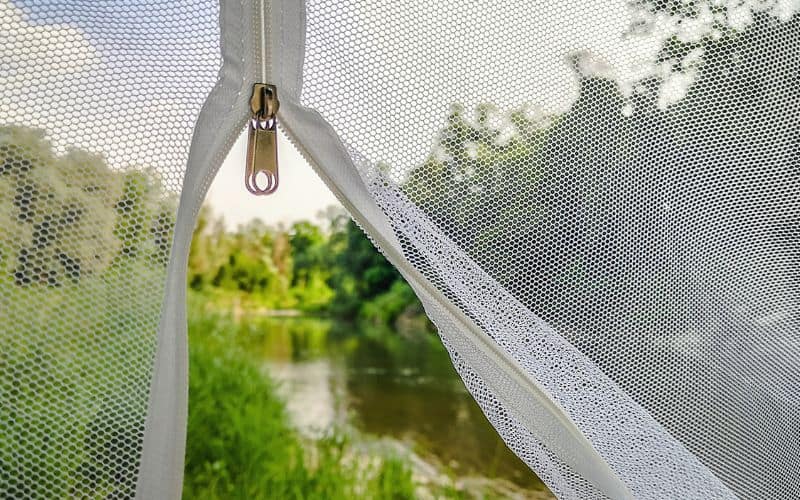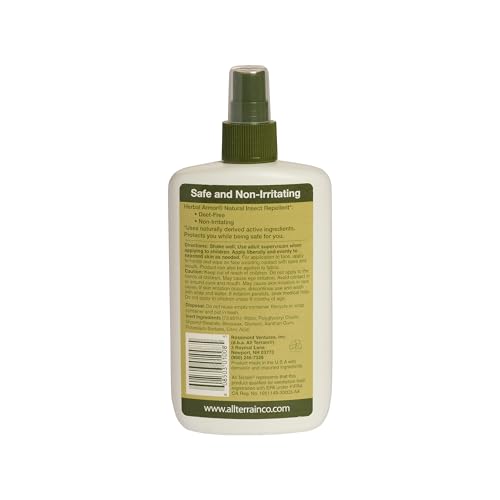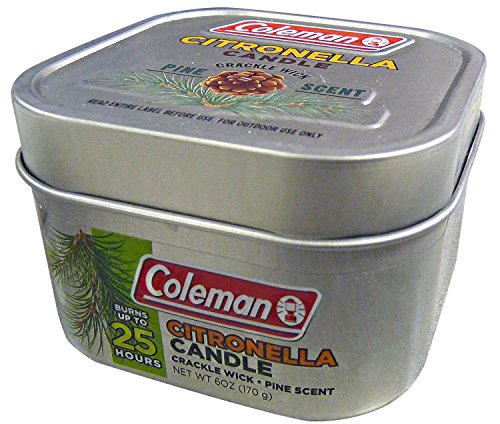Over the years, we’ve heard of many quirky and kooky ways to beat the skeeters when spending nights in a tent or RV. Most of them have one thing in common: they don’t work!
So, rather than have our readers using flame-throwers to torch airborne aggressors baying for their blood or dousing their skin in bleach, we decided to keep things practical (and safe!). Below, you’ll learn how to stave off the mosquitoes on your next camping trip using nineteen different tricks and methods, all of which work!
Table of Contents
- 1. Choose Your Campsite Carefully
- 2. Use Permethrin-Coated Clothing
- 3. Bring DEET
- 4. Wear Mosquito-Repellent Bracelets
- 5. Keep It Clean!
- 6. Close Those Doors!
- 7. Avoid Dry Ice (or Use It to Your Advantage)
- 8. Use Essential Oils
- 9. Bring Citronella Candles
- 10. Use Bug-Repelling Diffusers or a Coil
- 11. Burn Sage
- 12. Use Vinegar
- 13. Make a Mosquito Trap
- 14. Get Some Garlic
- 15. Cover Up
- 16. Go Unscented
- 17. Use Mosquito Nets and Screens
- 18. Turn Off Lights
- 19. Light a Fire!
- How to Keep Mosquitoes Away While Camping
1. Choose Your Campsite Carefully
Mosquitoes aren’t very picky about where they do their human hunting, but there are certain environments in which you are more likely to find yourself preyed upon than others. These are generally humid areas, particularly those where there is stagnant water nearby.
When pitching your tent, therefore, it’s best to pick a spot that’s far from any ponds, creeks, boggy areas, or tall grass that holds rainwater.
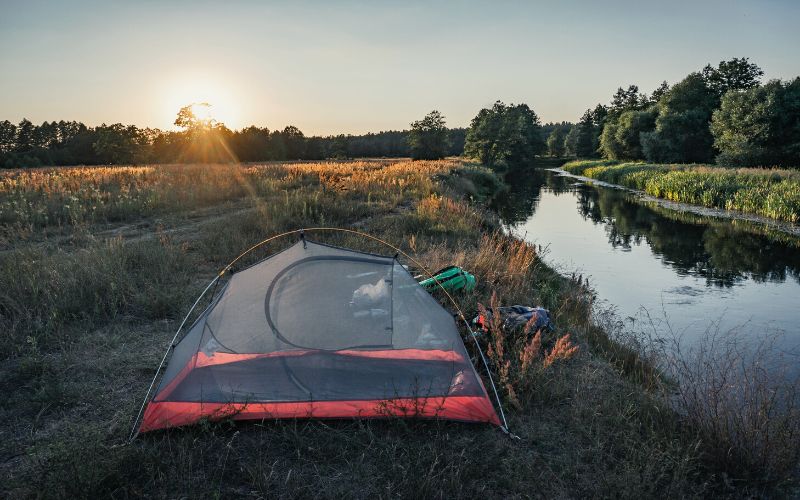
2. Use Permethrin-Coated Clothing
Permethrin is an insecticide that can be applied to clothing to help deter skeeters. You can either buy clothing pre-treated with permethrin or purchase a spray and apply it yourself.
The good news is that permethrin kills mosquitoes upon contact. The bad news? For this tactic to work, you’ll need to cover up in long pants and long-sleeved shirts…not ideal in hot weather.
Our favorite permethrin treatment for clothes is the Sawyer Products Premium Insect Repellent Spray.
3. Bring DEET
There are countless insect repellents on the market these days, but the most effective in keeping pesky bugs at bay, especially mosquitoes, is still the old, tried-and-true DEET.
Our favorite DEET-rich bug repellent is REPEL 100, which contains 98% DEET.
If you’d prefer a DEET-free repellent, we recommend the All Terrain Herbal Armor.
4. Wear Mosquito-Repellent Bracelets
Mosquito-repellent bracelets won’t win you any prizes for style, but they will help prevent mosquito bites. Function over fashion, right?!
Most of these bracelets use natural insect repellents like peppermint, citronella oil, lemon eucalyptus oil, or geraniol oil. While they won’t keep the skeeters away when used alone, they will add a worthwhile, extra line of defense when combined with any of the other strategies on this list.
Our favorite mosquito-repelling bracelet is the Cliganic Deet-Free Bracelet.
5. Keep It Clean!
One surefire way to attract mosquitoes to your campsite is to leave it in a mess. We’re not suggesting that skeeters love untidiness (if this was the case, the home of this writer would be infested!), merely that trash, and leftover food and drinks will attract them.
The take-home? Do a little “housekeeping” after every meal and store trash carefully.
6. Close Those Doors!
This might seem like a no-brainer, but too often campers become lax and leave the tent (or RV) door open behind them, essentially opening the floodgates to marauding or stealthy skeeters.
While mosquitoes tend to do most of their business in the evening and early morning, the odd rogue skeeter may sneak into your tent in the daytime to await a nocturnal feed. To avoid this, keep those doors or your mosquito net closed at all times!
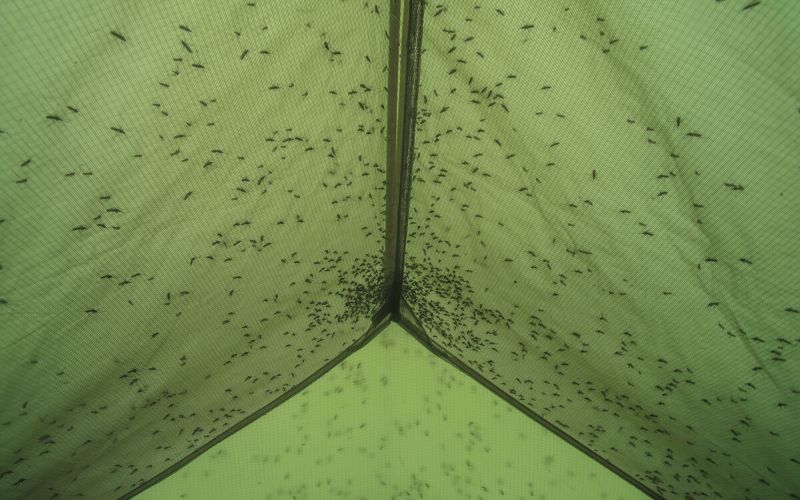
7. Avoid Dry Ice (or Use It to Your Advantage)
Dry ice is a great way to keep the contents of your camping cooler cold or frozen for longer. However, it also emits carbon dioxide (CO2), which attracts mosquitoes.
So, what to do?
You have two options.
First, you can use regular, wet ice and grin and bear that lukewarm beer on day three of your camping trip.
Alternatively, you can take advantage of your dry ice’s skeeter-seducing capabilities and make a trap.
All you have to do is cut off the top of a plastic bottle, place a chunk of the ice in the bottom of the bottle, remove the screw cap from the top, and then place the top upside down inside the base. Next, kick back and watch those pesky mosquitoes fly in!

8. Use Essential Oils
A handful of essential oils have properties that deter skeeters. Citronella oil, lemon eucalyptus oil, and peppermint oil are, in our experience, the most effective.
Our favorite essential oil for scent and keeping mosquitoes at bay is Trail Guard Essential Oil Blend.
9. Bring Citronella Candles
This old-school method has its detractors, and we won’t claim that it provides a mosquito-proof system of defense on its own. When used in conjunction with other methods, however, there’s no denying that a few strategically placed citronella candles around camp can help keep all pesky insects at a safe distance.
10. Use Bug-Repelling Diffusers or a Coil
Hauling a huge bug zapper into the wilds, along with a power source to run it, is impractical. Luckily, these days there is a shedload of lightweight, portable alternatives to bug zappers on the market.
The best of these are bug-repelling diffusers or coils. These battery-operated devices use essential oils and pesticides like metofluthrin or pyrethrum, which are diffused by way of a fan. Set up a handful of them around camp and you’ll have an invisible shield keeping the biters at bay!
Our favorite coils? The OFF! Backyard Repellent Coils.
And our favorite diffuser? The Thermacell Patio Shield.
11. Burn Sage
This one is possibly the oldest known method of repelling mosquitoes. For centuries (millennia), p*ssed-off humans have turned to sage to keep skeeters and other insects away.
Sage, sadly, isn’t mosquito kryptonite and might leave your hair and clothing smelling like you’ve just walked out of a wildfire, but it will help rebuff the attacks of those pesky critters when burned.
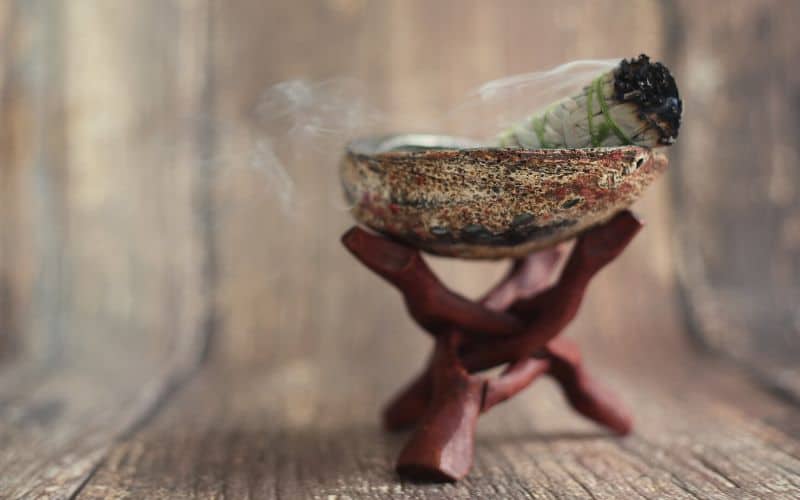
12. Use Vinegar
We wouldn’t recommend this one if you’re single and use camping trips as a means of meeting potential partners, but there’s no doubting its effectiveness. Mosquitoes and other bugs hate the taste and smell of vinegar, which makes it a great natural mosquito repellent.
To use vinegar as a repellent (both white vinegar and apple vinegar work), you can either smear it on your skin or dilute it with water in a spray bottle and then apply it to your clothes, skin, hair, and gear.
13. Make a Mosquito Trap
If you don’t have a cooler with dry ice (see above), you can make an effective skeeter trap using a very similar method.
All you have to do is empty a plastic bottle, cut the top off (around two-thirds of the way down), throw some brown sugar and half a cup of warm water in the bottom, then plop the top of the bottle inside the base upside down. Now, just kick back and watch while those unwanted pests swarm into your trap.
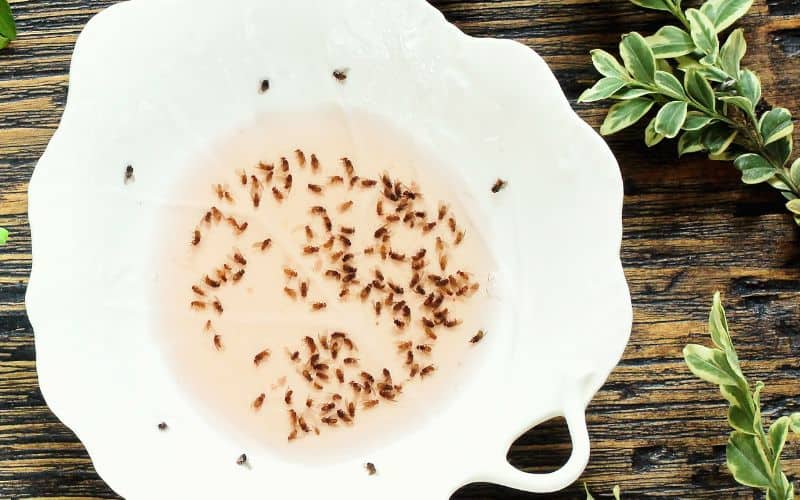
14. Get Some Garlic
Mosquitoes can be deterred by strong-smelling foods, and none is more strong-smelling than garlic. Even if you don’t fancy eating garlic-laden meals or hanging cloves of the stuff around camp, just taking capsules will do the trick. You (and your campmates) won’t be able to smell it, but you’ll give off a very faint body odor that will repel skeeters.
Not a fan of garlic, even in capsule form? If so, try citrus fruits or onions, both of which are known to be effective mosquito repellents.
15. Cover Up
The easiest way to avoid your hide becoming covered in itchy bites is to put a physical barrier between it and the biters, i.e. clothing.
But not just any old clothing will do.
First up, make sure you wear long sleeves and pants, especially in the morning and evening, when skeeters are most active. If the clothing has a permethrin treatment, all the better!
Secondly, avoid wearing dark clothing. Mosquitoes are attracted to heat, and dark colors hold in heat more than light colors. Other studies have shown that skeeters are big fans of red and orange, so take care when packing for your trip.
For this skeeter-beating tactic to work, of course, you’ll also have to apply bug spray to any exposed skin, otherwise, the skeeters will simply direct their unwanted attention there.
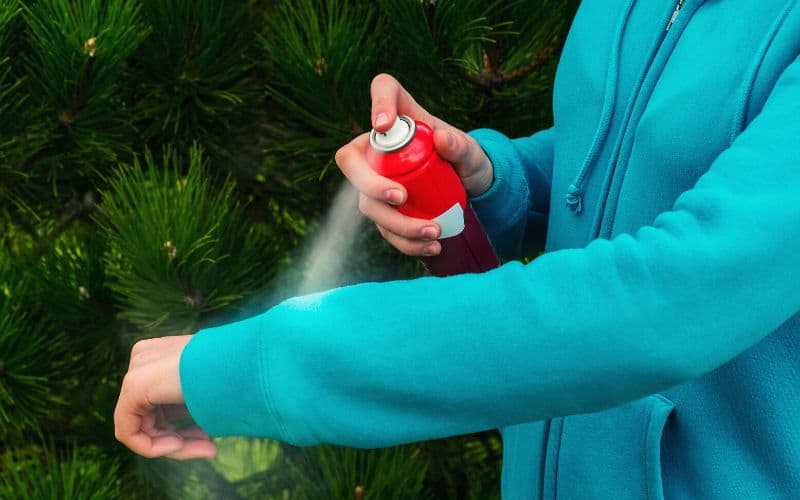
16. Go Unscented
Perfume, aftershave, and body sprays all attract skeeters, and wearing them is a sure way to get all kinds of insect bites, even if you happen to wear an effective insect repellent at the same time. This being so, going au naturel is the best policy when in the great outdoors.
17. Use Mosquito Nets and Screens
The objective here is to turn your campsite into a mosquito-free Alamo. In an ideal world, you could have mosquito netting draped over and around every seating area, suspended with poles or guy lines tied between trees, to create a huge skeeter-free zone all around your tent and campsite.
If this sounds too taxing, a more manageable alternative is to invest in a few large sheets of mosquito netting and throw this over your tent or RV’s awning, screen room, or porch.
This will do two things. First, it will provide a “first line of defense” that shields against skeeters entering your tent’s sleeping area. Secondly, it will allow you to exit the sleeping area without fear of being bitten and thus reduce the risk of cabin fever (a side effect suffered by many travelers in skeeterland).
18. Turn Off Lights
Mosquitoes might be thought of as the ugly, irritating, sharp-fanged cousins of the moth. Just like moths, they love a bit of light and mosey merrily toward it when out on their evening (or early-morning) human hunts. To avoid mosquitoes invading your campsite, turn off the lights and instead…
19. Light a Fire!
The logic here is simple: a skeeter isn’t going to be biting if it can’t breathe. Crude as it may sound, smoke is an effective mosquito repellent and a fire is, all told, about the simplest way to keep mosquitoes away from your camping area.
As mentioned above, lighting a fire will also provide a good source of light if you choose to go without lanterns, string lights, or other sources of illumination that attract skeeters and other pests.
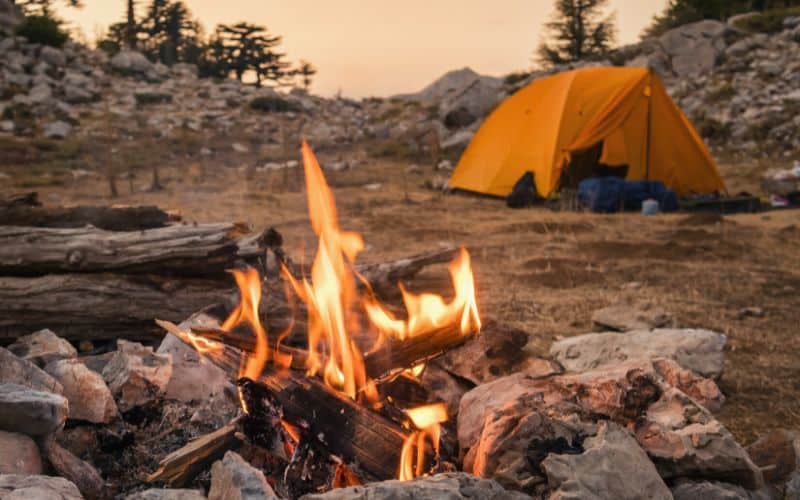
How to Keep Mosquitoes Away While Camping
There’s no getting around it – keeping yourself free of mosquito bites on any camping trip is a tough task. By following the above tips on your next camping trip, however, you’ll be seriously increasing your chances of returning bite-free at the end of it!
If you liked this article on how to keep mosquitoes away while camping or have any questions, let us know by leaving a comment in the box below. And if you’d like to share it with your friends, please do so!
